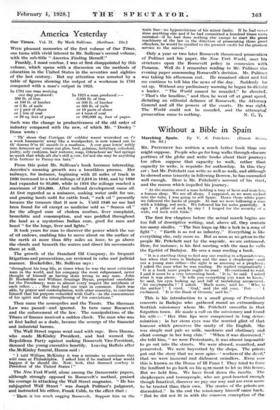America Yesterday
Our Times. Vol. H. By Mark Sullivan. (Scribner. 21s.)
Wrrit pleasant memories of the first volume of Our Times, one turns with vivid interest to Mr. Sullivan's second volume,
with the sub-title " America Finding Herself."
Frankly, I must confess, I was at first disappointed by this volume, which opens with a discussion on the methods of education in the United States in the seventies and eighties of the last century. But my attention was arrested by a table of figures showing the output of a workman in 1781 compared with a man's output in 1925.
In 1781 one man working
one day produced: In 1925 a man produced :-- 500 lb. of iron 5,000 lb. of iron or 100 ft. of lumber or 500 ft. of lumber or 5 lb. of nails or 500 lb. of nails or pair of shoes or 10 pairs of shoes or I ton of coal or 4 tons of coal or 20 sq. feet of paper or 200,000 sq. feet of paper.
Such was the change in productiveness of the old order of industry compared with the new, of which Mr. " Dooley " Dunn wrote :
" Th' shoes that Corrigan th' cobbler want wurruked on Fr a week hammerin' away like a woodpecker, is now tossed out be th' dozens fr'm th' mouth iv a masheen. A cow goes lowin' softly into Armours an' comes out glue, beef, gelatine, fertylizer, celooloid, joolry, sofy cushions, hair restorer, soap, lithrachoor an' bed springs so quick that while aft she's still a cow, for'ard she may be anything fr'm buttons to Pannyma hats."
Froin this point Mr. Sullivan's book becomes interesting. America's amazing growth was a breathless process. Her railways, for instance, beginning with 23 miles of track in 1880 increased to a total mileage of 2,818 in 1840, and by 1880 had expanded to 93,000, while in 1916 the mileage reached a maximum of 254,000. After railroad development came oil.
At first regarded as a nuisance, making water unfit for use, and grazing lands unfit for cattle food, " rock oil " presently became the treasure that it now is. Until 1840 no use had been found for oil except as medicine sold as " Seneca oil " for the alleged cure of cholera morbus, liver complaint, bronchitis and consumption, and was peddled throughout the land as a mysterious Indian cure, good for man and beast " for the lungs, liver and lights."
It took years for man to discover the power which the use of oil endows, enabling him to move about on the surface of the earth at more than fifty miles an hour, to go above the clouds and beneath the waters and direct his movements there at will.
The growth of the Standard Oil Company, its frequent litigations and prosecutions, are reviewed in calm and judicial manner. Rockefeller, Mr. Sullivan says :
"throughout his long life, at times when he was the most criticized man in the world, and his company the most subpoenaed, never thought of himself as having done wrong to any man. John D: Rockefeller and William Jennings Bryan, perpetual candidate for the Presidency, were in almost every respect the antithesis of each other. . . But they had one trait in common. Each was able, by prayer and contemplation, with utter sincerity, to convince himself that his purpose coincided with God's—to the contentment of his spirit and the strengthening of his convictions."
Then came the monopolies and the Trusts. The Sherman Law was passed—and ignored. In turn came Roosevelt and the enforcement of the law. The manipulations of the Titans of finance received a sudden check. The man who was at first hailed as a dude, became the scourge of the financial and industrial barons.
The" Wall Street organs went mad with rage. Boss Hanna, who made McKinley President, and had warned the Republican Party against making Roosevelt Vice-President, damned the young executive heartily. Leaving Buffalo after the McKinley funeral, Hanna said :
" I told William McKinley it was a mistake to nominate that wild man at Philadelphia. I asked him if he realized what would happen if he should. die. Now, look, that damned cowboy is President of the United States 1 "
The New York World, alone among the Democratic papers, although strongly opposed to Roosevelt's method, praised his courage in attacking the Wall Street magnates. " He has subjugated Wall Street " was Joseph Pulitzer's judgment, and instructed his editor, Frank Cobb, to the effect that : •
Theft( is too much nagging Roosevelt. Support him on the
main line—no hypercriticism of his minor faults. If he had never done anything else and if he had committed a hundred times more mistakes—if he had done nothing else except to start the great machinery of the law in the direction of prosecuting these great offenders, he would be entitled to the greatest credit for the greatest service to the nation."
Only a year or two later Roosevelt threatened prosecution of Pulitzer and his paper, the New York World, over his strictures upon the Roosevelt policy in connexion with Panama. Well do I remember reading to Mr. Pulitzer the evening paper announcing Roosevelt's decision. Mr. Pulitzer was taking his afternoon rest. He remained silent and bid me continue to tell him the news of the day. Suddenly he sat up. Without any preliminary warning he began to dictate a leader. " The World cannot be muzzled," he shouted. " That's the headline," and then he went off at great speed, dictating an editorial defiance of Roosevelt, the Attorney General and all the powers of the courts. He was right. The World could not be muzzled, and the attempted






































 Previous page
Previous page